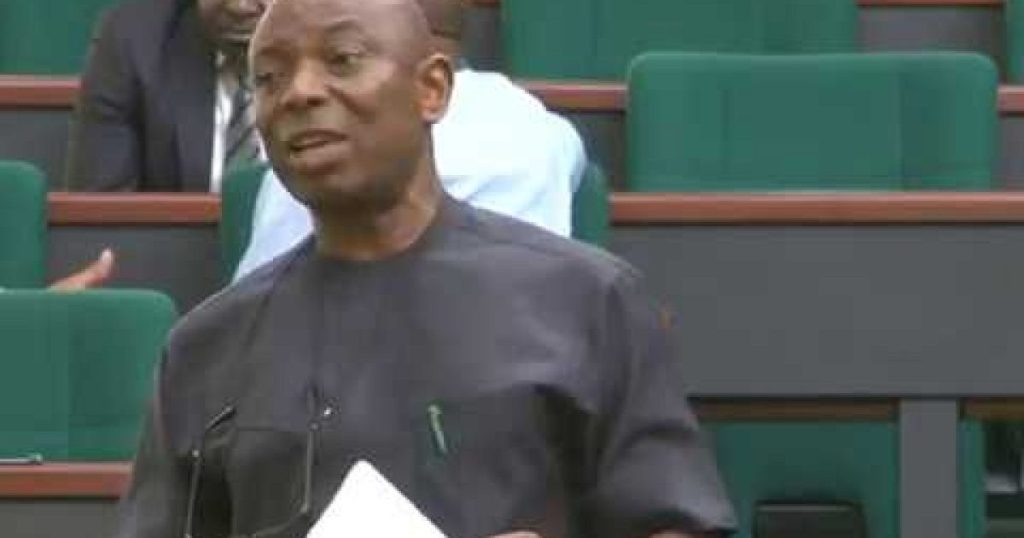The conversion of residential areas into commercial and semi-industrial zones across Nigeria has become a growing concern, raising alarms about the potential for uncontrolled urban sprawl and the degradation of living conditions. Awaji-Inombek Abiante, Chairman of the House of Representatives Committee on Urban Development and Regional Planning, voiced these concerns during a budget defense session with the Ministry of Housing and Urban Development. He emphasized the critical need for comprehensive impact assessments before approving such conversions, stressing that the focus should not solely be on providing housing but also on ensuring proper urban planning to prevent the emergence of slums within city centers. This proactive approach, he argued, would mitigate the risks associated with unplanned development and contribute to creating sustainable and livable urban environments.
Abiante’s concerns extend beyond immediate conversions to encompass future housing developments. He advocated for thorough assessments to be conducted for all new and planned estates, citing the example of Trademore Estate in Abuja. Originally designed to alleviate housing shortages, the estate now grapples with recurrent flooding, highlighting the unintended consequences of inadequate planning. This case serves as a cautionary tale, underscoring the importance of foresight and comprehensive evaluation in urban development projects. By prioritizing impact assessments, Abiante believes Nigeria can avoid replicating such problems and ensure that new developments contribute positively to the urban landscape.
The chairman also highlighted the need for a revised legal framework to effectively address town planning challenges. He revealed that the House of Representatives has initiated the process of repealing and re-enacting the relevant Act, particularly focusing on provisions related to the town planning profession. This legislative effort signifies a commitment to modernizing urban planning regulations and strengthening the role of professionals in shaping sustainable urban development. The ongoing consultations and engagements with Nigerians demonstrate a commitment to inclusivity and transparency in the legislative process, ensuring that the updated Act reflects the needs and aspirations of the people.
The Ministry of Housing and Urban Development, represented by Permanent Secretary Shuaib Belgore, acknowledged the challenges and outlined plans to address some of the concerns. Belgore revealed the ministry’s intention to establish a national housing regulatory authority, a move aimed at standardizing building regulations and ensuring consistent quality across housing projects nationwide. This initiative reflects a recognition of the need for greater oversight and regulation in the housing sector to ensure safety, sustainability, and adherence to best practices. The authority’s establishment could play a crucial role in improving the overall quality of housing and promoting responsible development.
However, the ministry’s plans are hampered by significant budgetary constraints. Belgore expressed concern over the drastic reduction in the ministry’s budget from ₦162 billion in 2024 to ₦83.7 billion in 2025, a cut he described as “grossly inadequate.” He highlighted that the Urban and Regional Development Department, responsible for crucial urban planning functions, received a mere ₦4.6 billion for various projects. This severe budget cut raises questions about the feasibility of implementing critical projects and achieving the ministry’s objectives in promoting sustainable urban development. The limited resources could hinder efforts to address the challenges of unplanned urbanization and exacerbate existing problems.
The juxtaposition of the urgent need for improved urban planning and the significant budget cuts creates a precarious situation. While the legislative efforts to update the town planning Act and the proposed establishment of a national housing regulatory authority signal positive steps towards more effective urban management, the lack of adequate funding poses a significant obstacle. The reduced budget could undermine the ministry’s capacity to implement necessary reforms, conduct thorough impact assessments, and enforce building regulations, potentially exacerbating the very problems they seek to address. The situation underscores the need for a serious reassessment of funding priorities to ensure that adequate resources are allocated to support sustainable urban development and prevent further deterioration of urban environments. Without sufficient investment, the vision of well-planned, livable cities may remain elusive, and the challenges of unplanned urbanization will likely continue to escalate.














